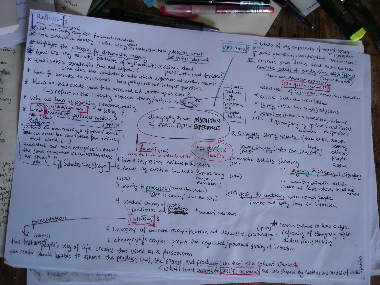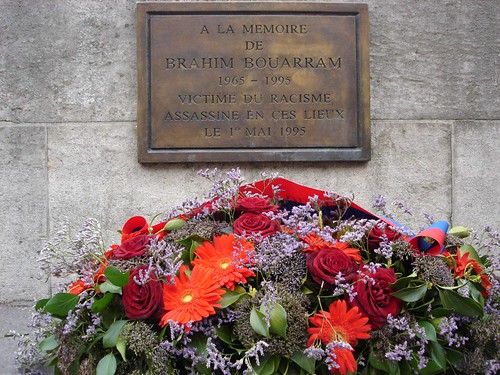27/05/06
“Elle va se faire draguer”
Every blog post I’ve tried to write on gender strands for some reason or another before they reach the web. The following text was meant to be a simple and silly account of a quick bike trip around Belleville. However, when I let it rest for a moment in order to start sorting out the huge heap of paper – flyers, magazines, newspapers, brochures… -that was threatening to cover more and more of the surface space in my little office-cum-livingroom-cum-kitchen, I came a cross an old article about a café that I had just passed on my trip. This café reached the national media right after the Mohammad caricature affaire because they put up an exhibition with blasphemous caricatures right in the heart of Belleville. Well, the article in itself wasn’t enough to put me off track. It was rather it’s point of view, or framing, that threatened to put my experiences on my little trip in a new light. I started worrying that my silly little text had to become a bit more complicated.
20/05/06
From La Sorbonne to Université de Saint-Denis
For those who read French, I can recommend Le Bondy Blog. A couple of journalists from the Swiss magazine L’Hebdo settled in the banlieue Bondy during the November revolts, and stayed there for more than 4 months. Before they left, 8 local youth got training in journalism and took over the blog after the professionals. Every post they write – be it miniskirts or soldiers from the colonies helping out France during the war – initiates a lively debate. I had just read Hanane Kaddour’s very instructive post on how geography determines which university you can apply for when I had the opportunity to have a closer look at 4 different university locales in the Paris area in just a few days.
10/05/06
09/05/06
French versus Germanic national identity
I don’t have the habit of commenting news here, but an article in Der Spiegel (English version, link by Erkan’s fielddiary) caught my attention. First I didn’t really understand what it was about; natality rate in Germany going down…? Yes, that was obviously the case, but I was soon to discover that this was not the main challenge presented in the article. Further down I read that: “German pre-schools will soon be filling up with children who are neither German nor Christian.” Got to change your naturalisation procedures then, I thought.
But as I read on, I understood that changing the way German nationality is obtained wouldn’t help: “Germans are not only dying out, but they're slowly being replaced by non-Germans.” And so on. (“Will the German national anthem one day be sung in Turkish?”).
I should in fact have got the clue from the title “On becoming Un-German”. And curiously, I should also have got the clue from a news reportage I’d watched just a few minutes before. It was about the children born to French women and German soldiers during World War 2. The reporter said that the ideology of Nazism didn’t encourage the Germans to have relations with the French women, who contrary to the Danes and Norwegians, were seen as abâtardi (“degenerated”, from “bastard”).
A similar discourse on “Norwegians” slowly being replaced by “non-Norwegains” is present in Norway as well. One can say many things on the republican notion of French identity, but at least it’s not overtly racialised. Thus, I doubt that a text like the one in Der Spiegel could have been written in a major French newspaper.
03/05/06
1st of May in Paris
1st of May, in the morning, I cycled through the quiet streets to a bridge by the Louvre Museum. At the Pont du Carrousel, there is a commemorative plate for Brahim Bourram, who 11 years ago, on this day, drowned after he was thrown into the river Seine by skinheads coming from the annual Front National demonstration. Paris Major Delanoë had put down flowers, and every year MRAP – (Movement against racism and for the friendship between the peoples) – arrange a commemorative ceremony. General secretary Mouloud Aounit didn’t have a microphone, and I was too far away to hear what actually was said, but MRAP has posted a statement on their webpage, which I shall quote from as it speaks directly to the current situation in France:
30/04/06
“Monsieur Sarkozy, if you don’t love France, leave her”
Today’s most important event is probably what I’m watching right now; the French cup final described as the dream final for the supporters and the nightmare for the forces of order. Since it’s between my two and only favourite French teams, it’s a dream final for me as well. After I’ve settled my little foldable bike import firm in Marseille my loyalties will probably settle for the Mediterraneans, but until then I’ve spent too much time in the capital to not have divided loyalties. There goes La Marseillaise… All the 80 000 (with tickets sold out weeks ago and reaching 400€ at the internet) are not singing, but quite a few are. The President arrives and shakes the hands with all the players…
29/04/06
Marseille (communications)
I’ve spent Easter time in Marseille. In 3 hours and 10 minutes the TGV takes you more than 800 km south from Paris to the Mediterranean city, through the French countryside, past a few villages, a castle or two on top of a cliff, a viaduct, blooming apple orchards, the river Rhone and loads of white cows. “Quite why, you might wonder,” the Guardian wrote in the heat of the CPE-affaire, “is a country with wonderful infrastructure, beautiful towns and countryside, world-class companies and highly productive workers tearing itself apart again?” I do find that paradox intriguing, and the comfort of the Train Grande Vitesse was an apt opportunity to give the transportational part of it a thought. Most major train itineraries in France take around 3 hours, an infrastructural feat I – perhaps because I come from a country made of massive granite - find very fascinating. I wonder how people can bother to take domestic planes at all from the capital in this country, not to mention to London, when they can just jump on the efficient metro to one of the grandiose railway stations and get on a double-decker TGV, and get off at an equally grandiose station at their destination a few hours later. (Public transport in this country is one of the very few things that run on time – after 6 months here I still haven’t figured out exactly when the TV news starts, and I’m still not sure how delayed the conference, demo, meeting etc. will be – but public transport is reliable indeed, as long as there isn’t a strike or a manif blocking the way).
11/04/06
“Ethnography as the inscription of participatory experience”

After an oh so long time in the field, I’ve finally got around to make a summary of some good advice I’ve returned to from time to time during my stay. They’re rather commonsensical knowledge for any graduate in anthropology, but it’s surprising how quickly I get accustomed to the details of everyday life, and thus stop paying attention… (from Writing ethnographic fieldnotes (Emerson, Fretz and Shaw, 1995)).
Pages: << 1 ... 6 7 8 9 10 ...11 ...12 13 14 ...15 ...16 17 >>


